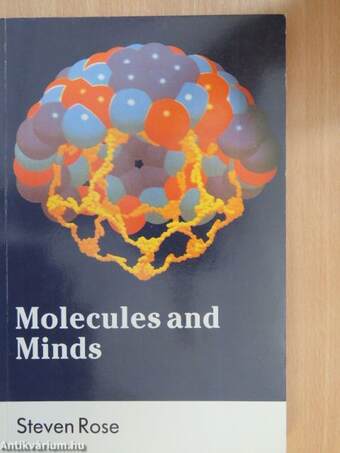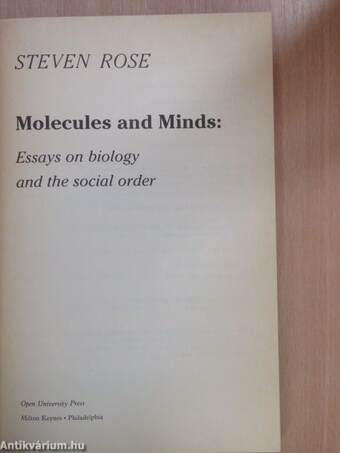1.067.081
kiadvánnyal nyújtjuk Magyarország legnagyobb antikvár könyv-kínálatát

VISSZA
A TETEJÉRE
JAVASLATOKÉszre-
vételek
Molecules and Minds
Essays on biology and the social order
| Kiadó: | Open University Press |
|---|---|
| Kiadás helye: | Milton Keynes |
| Kiadás éve: | |
| Kötés típusa: | Ragasztott papírkötés |
| Oldalszám: | 144 oldal |
| Sorozatcím: | |
| Kötetszám: | |
| Nyelv: | Angol |
| Méret: | 23 cm x 15 cm |
| ISBN: | 0-335-1581-3-7 |
naponta értesítjük a beérkező friss
kiadványokról
naponta értesítjük a beérkező friss
kiadványokról
Előszó
TovábbFülszöveg
Are there any limits to what science can ever know, and how far it can
be used to change the world, or is science limited by matters of
ideology, politics and power? Does the new biology tell us that we
are the prisoners of our genes or does our biology make us
free? Is a neutral science being misused for military purposes and the
abuse of animal rights, or are the new arms race in genetic engineer-
ing and the millions of laboratory animals killed each yearthe
inevitable consequences of a science done not 'for the people' but to
meetthe needs of the military, of profit, and of a reductionist
scientific imperialism? How should conditions like depression, anxiety
and schizophrenia be explained — as products of disordered bioche-
mistry, or of a disordering society?
¦
In this set of essays, the author sets out to ask and to a nswer these
questions. Drawing on his own experience as a researcher working
at the interface between biology and psychology studying the cellu-... Tovább
Fülszöveg
Are there any limits to what science can ever know, and how far it can
be used to change the world, or is science limited by matters of
ideology, politics and power? Does the new biology tell us that we
are the prisoners of our genes or does our biology make us
free? Is a neutral science being misused for military purposes and the
abuse of animal rights, or are the new arms race in genetic engineer-
ing and the millions of laboratory animals killed each yearthe
inevitable consequences of a science done not 'for the people' but to
meetthe needs of the military, of profit, and of a reductionist
scientific imperialism? How should conditions like depression, anxiety
and schizophrenia be explained — as products of disordered bioche-
mistry, or of a disordering society?
¦
In this set of essays, the author sets out to ask and to a nswer these
questions. Drawing on his own experience as a researcher working
at the interface between biology and psychology studying the cellu-
lar mechanisms involved in learning and the storage of memory he -
shows how it may be possible to achieve a unified, non-reductionist
science which transcends the sterile old dichotomies of biology and
culture, nature and nurture, gene and environment, mind and brain.
This book raises important questions about the methods, uses and
purposes of science, especially the new theories and techniques of
biology after the DNA revolution. Written in clear and non-technical
language, the essays in Molecules and Minds will be of interest to
students of biology, psychology and philosophy, or indeed to anyone
concerned with understanding what the biological revolution of the
last 25 years can tell us about the past, present and future of the
human condition. V
Steven Rose is Professorof Biology at the Open University and
Director of its Brain Research Group. His previous books include the
much acclaimed Chemistry of Life and Not in our Genes (both
Penguin). Vissza
Steven Rose
Steven Rose műveinek az Antikvarium.hu-n kapható vagy előjegyezhető listáját itt tekintheti meg: Steven Rose könyvek, művekMegvásárolható példányok
Nincs megvásárolható példány
A könyv összes megrendelhető példánya elfogyott. Ha kívánja, előjegyezheti a könyvet, és amint a könyv egy újabb példánya elérhető lesz, értesítjük.








